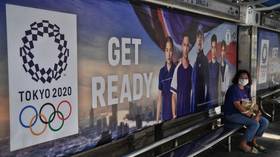Japan and IOC are resisting pressure to postpone Tokyo Olympics… but for how much longer?

With the sporting landscape decimated by the coronavirus pandemic currently overwhelming the world, the one major event yet to be called off is this summer's Tokyo Olympics, leaving athletes in a type of competitive limbo.
Most sports leagues across the globe have shut their doors for the health and safety of athletes, staff and fans alike.
The UEFA European Championships, also originally scheduled for this summer, have been pushed back to 2021 while uncertainty remains as to when major sporting leagues in Europe, the US and beyond will once again resume operations.
However, the one event yet to be seriously restricted by the pandemic is arguably the jewel in the 2020 sports calendar - the Olympic Games, due to begin in Tokyo on July 24.
Also on rt.com US Track & Field adds weight to calls for Tokyo Olympics postponement as delay seems increasingly inevitableThe International Olympics Committee (IOC) announced in February that they saw themselves as having a three-month window in which to make a decision on the efficacy of holding the tournament as planned. However, in the time since that statement was made the novel coronavirus has exploded in numerous countries across the world, prompting measures to be implemented by various sports' governing bodies to attempt to mitigate the spread of the virus.
To date, Japan has seen a relatively low rate of Covid-19 infections but critics say that these figures are influenced by the low number of tests administered in the country to date.
As of Saturday, the country had just over 1,000 confirmed cases of Covid-19 among its populace and 36 deaths - a number significantly lower than the 80,000-plus cases in China and the more than 8,500 in South Korea.
Per Business Insider, the country has tested less than 17,000 (again, as of Thursday) of a population of 126 million people and has prompted experts to warn the country of a false sense of security in relation to the pandemic.
Amid the coronavirus pandemic, the IOC refuses to postpone the Summer Olympics in Tokyo.50,000 people showed up Sunday in Sendai, Japan, to take pics of a cauldron with the Olympic flame. (Japan has documented 1,054 coronavirus cases to date and 36 deaths.) pic.twitter.com/ishhoBHCFg
— Rick Westhead (@rwesthead) March 22, 2020
As if to emphasize this apparent lack of concern, a reported 50,000 people turned up to the city of Sendai on Sunday to see the cauldron holding the Olympic flame in the type of public gathering now largely restricted in most major countries.
What's more, the longer that the uncertainty about the event continues, the further the risk that the athletes who are training for the various events will put themselves - and people around them - at risk.
USA Track and Field, the governing body which oversees athletics in the United States, called for the games to be postponed on Saturday in an echo of a similar request put forth by USA Swimming.
"The alternative of moving forward in light of the current global situation would not be in the best interest of our athletes (as difficult as that decision might be)," USA Track and Field chief executive Max Siegel said this week.
Olympic logo redesign of Corona virus effect. pic.twitter.com/mHX7MNhgs9
— Echa | Andrie Rhesa (@romojava) March 15, 2020
Serbia and Croatia have also announced their opposition while German former world champion fencer Max Hartung has already announced that he will boycott the Olympics if they are held this year.
"I cannot train at the moment but more importantly I thought how can I as a sportsman contribute to end this crisis and I can do that by showing strength to do the right thing instead of training," Hartung said. "So those dates in my view are not possible."
Many athletes have also said that numerous qualification events have been canceled, while various training facilities have been shut down.
Kind of insane that the Olympics haven't been delayed yet. What's wrong with the International Olympic Committee?
— Grant Wahl (@GrantWahl) March 21, 2020
Indeed, the longer that this impasse continues the harder it becomes to make a definitive call. The safety of both athletes and fans, many of whom would be traveling to Tokyo from infected regions, is paramount, particularly with the majority of the world's population now living in a society actively promoting social isolation.
IOC President Thomas Bach says that any decision to postpone the Olympics cannot be taken lightly and presents numerous problems not present in other sports.
"The Olympic Games cannot be moved like a football game next Saturday," he said, according to Germany's SWR network. "It is a complex undertaking and you can only act responsibly when you have a clear decision-making foundation.
"A cancellation of the Games would be the least fair solution. A cancellation would destroy the Olympic dream of 11,000 athletes of 206 Olympic committees."
Also on rt.com Were coronavirus-threatened Tokyo Olympics CURSED all along? One Japanese official thinks so…However, reports from Reuters on Sunday suggested that IOC chiefs are seriously considering their options with regard to announcing a postponement in which they are understood to be working out different timeframes of when a postponed Olympic Games could be held, with a source telling the news agency that a meeting to discuss this will be held, "very, very early next week."
So, if the Olympics does as expected and follows suit with the rest of the sporting world by announcing a postponement, it appears best to do so as expediently as possible. As each day passes, more and more athletes are putting themselves at risk - as well as directly contravening government guidelines to stay indoors - by ramping up their training and they deserve to be told with the utmost candor as to whether or not they will be expected to compete this summer.
It is easier to rip the band-aid off than it is to slowly tear it away. For the IOC, decision time is here.













